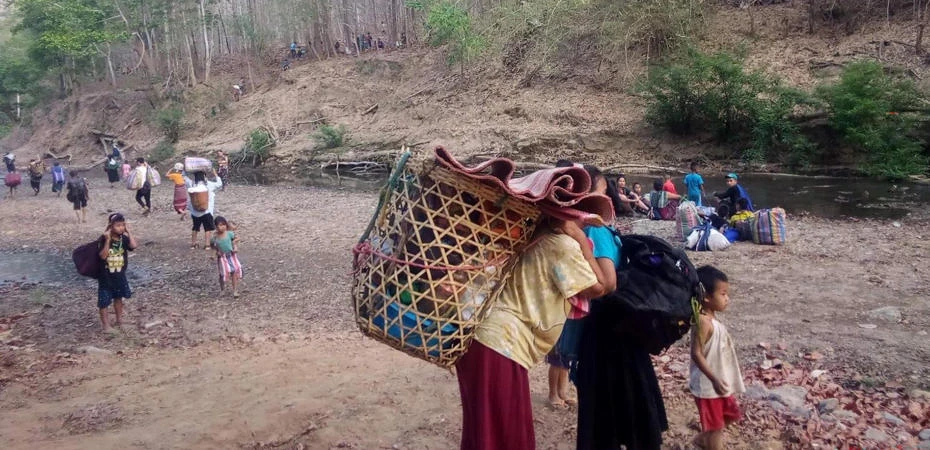
Myanmar on the brink of peace or an upsurge in violence
In Myanmar, a country long troubled by ethnic conflict and unrest, a cautious optimism emerges as the military junta’s grip weakens. At this critical point, a political solution to enduring conflicts seems increasingly possible. However, the risk of a major catastrophe looms if the junta escalates attacks. Myanmar’s minority Christians primarily live in conflict zones.

The conflict has driven many Karen from their homes. csi
The junta is facing an impending defeat, nearly three years after it staged a coup in February 2021. Over 200 of its army bases have been overrun by ethnic armed groups, signaling a significant loss of control and morale. The junta is witnessing mass defections and surrenders within its ranks.
In a striking turn of events, the military ruler has called for political dialogue with rebel groups, a move previously unthinkable. However, as the battle between the armed ethnic groups and the junta carries on, tens of thousands more civilians have been displaced.
“Spring revolution”
This change in the junta’s stance is not just a result of military setbacks. It is also influenced by the growing strength and sophistication of the rebel groups. These groups, now aided by private foreign technical experts and bolstered by financial support from bankers within the country, have made significant advances. The recent declaration of Kawlin town in central Myanmar as a town under civilian rule exemplifies this shift in power dynamics.
Parallel to these developments, the National Unity Consultative Council (NUCC), formed by pro-democracy forces and ethnic armed groups after the coup, has been instrumental in shaping Myanmar’s “Spring Revolution,” a political and social movement that aims for regime change. The Council’s adoption of the Federal Democracy Charter and the formation of the National Unity Government (NUG) mark critical steps towards a federal and democratic Myanmar.
Geopolitical maneuvering
Geopolitical dynamics have also been pivotal. The strategic interests of the United States and European allies in Myanmar are largely influenced by their competition with China for regional dominance in Southeast Asia. This rivalry is further fueled by Myanmar’s rich endowment of natural resources, such as oil, gas, and precious minerals. These factors significantly shape Western engagement in the region.
However, the Western powers, while backing Myanmar’s pro-democracy movement, have refrained from financial support due to its association with armed resistance against junta rule. This restraint is partly because some of the conflict areas are near China’s border. Direct Western engagement in armed conflicts adjacent to Chinese territory could cause significant concern to Beijing. This, in turn, might prompt China to bolster the junta’s capacity to suppress democratic efforts.
Amid these complications, the junta’s failure to suppress transnational fraud rings within Myanmar, targeting Chinese nationals, has strained relations with Beijing. Consequently, China appeared to tacitly support a strategy by a coalition of armed ethnic groups in Myanmar to overpower military forces across a substantial territory near the Chinese border.
This geopolitical maneuvering can be perceived as a blessing when viewed against the backdrop of deep-seated ethnic and religious tensions within Myanmar.
Plight of Christians
Myanmar’s Christians, who make up six percent (3.1 million) of the country’s population, predominantly reside in conflict zones. They face relentless persecution from the Burmese Buddhist nationalist junta, including bombings of churches and schools, sexual violence, and forced labor. The 2021 coup has exacerbated their plight, leading to over a million displacements, predominantly among Christians, and a surge in human trafficking.
For these Christians, the struggle for self-determination is deeply intertwined with their quest for religious freedom. They view the junta’s suppression of their religious practices as a direct challenge to their existence and rights.
Before the coup, various ethnic armed groups formed coalitions, each battling the junta’s control and atrocities independently. However, the coup unified the country against the junta, transcending ethnic and religious lines. Mainstream political forces integrated these ethnic armed groups into the broader national resistance movement.
As a result, the NUG includes representatives of various ethnic and political groups, transcending the traditional framework of the National League for Democracy party, led by the jailed Nobel Laureate Aung, San Suu Kyi. The goal is to overthrow the military and establish a federal and democratic union.
Challenges ahead
This level of unity and determination is unprecedented, even compared to the 1988 uprising against the military government, which started in Yangon city but spread nationwide.
However, Myanmar’s journey towards peace and democracy is fraught with challenges. The military’s response to these developments will be crucial. If it chooses to launch major attacks in retaliation, it risks plunging the country into a catastrophic conflict.
The international community will play a vital role in bringing about a peaceful resolution. Myanmar’s exclusion from the leadership of the ASEAN regional bloc in 2026 is a significant blow to the generals and a clear message of the region’s disapproval of their actions. This international pressure needs to increase urgently, so that combined with internal resistance, it steers Myanmar towards a more democratic and inclusive future.

